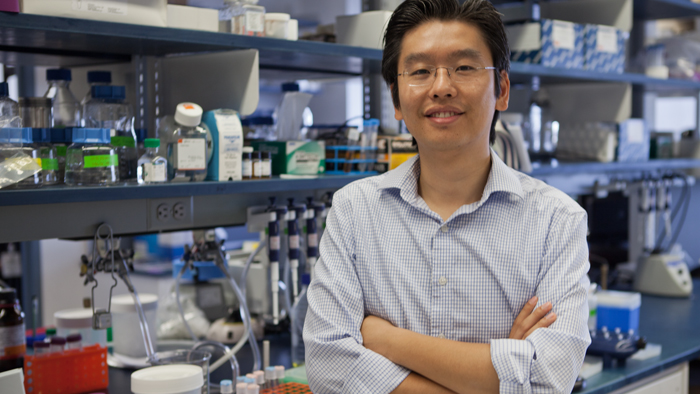News
Harris Wang Named 2018 Schaefer Scholar

Harris Wang, PhD, assistant professor of systems biology, has been named a 2018 Schaefer Research Scholar for his novel approach to explore the role that bacteria cells in our gastrointestinal tract play on the efficacy of drug therapies.
Dr. Wang, who has a joint appointment in the Department of Pathology and Cell Biology, develops new tools and platforms to determine how genomes in microbial populations form, maintain themselves, and change over time, across many environments. His goal is to use synthetic biology approaches to engineer ecologies of microbial populations, such as those found in the gut and elsewhere in the human body, in ways that could improve human health.
The project that won the support of the Schaefer Scholars Research program centers on developing a platform approach to systematically determine new mechanisms by which specific members of the human microbiome metabolize and alter drugs and pharmaceuticals. Dr. Wang and his group intend to evaluate the impact of the microbiome on drug efficacies using cellular and animal models, focusing on the gut microbiome—an important and underexplored area of research.
“There have been studies that suggest a key link between microbes and their role altering the efficacy of drug treatments,” says Dr. Wang, “but this area of research is unchartered territory, and there is more knowledge to be gained by pinpointing how a person’s microbiome could metabolize specific therapeutics by inactivation, degradation, or alteration of its chemical structures. The large-scale data generated from our project could improve drug prescriptions and clinical trials by reducing failures and classifying patients based on otherwise unknown yet important microbiome-drug interactions.”
Dr. Wang, who joined Columbia in 2013, is a systems and synthetic biologist who has invented several groundbreaking approaches for selectively reprogramming bacterial genomes. In 2017, he received the prestigious Presidential Early Career Award for Scientists and Engineers (PECASE), considered the nation’s highest award for young scientists and engineers conferred annually at the White House at the recommendation of participating federal agencies. Dr. Wang has also been recognized with a Sloan Research Fellowship , a National Institutes of Health Early Independence Award, and is a 2017 recipient of the Pathogenesis of Infectious Disease Award (PATH) by the Burroughs Wellcome Fund.
The Schaefer Research Scholars Program at Columbia’s Vagelos College of Physicians and Surgeons (P&S) supports research scientists who have distinguished themselves in the study of human physiology. Scholars, who are nominated by a committee of distinguished research faculty and selected by the dean of P&S, receive an award of $50,000 in discretionary funds and up to $220,000 in direct costs to fund research projects. The program is possible through an endowment from the Dr. Ludwig Schaefer Fund. Dr. Wang is one of four recipients of the Schaefer Scholars award this year.
Visit the CUIMC Newsroom to read more about the 2018 Schaefer Scholars .
-Melanie A. Farmer